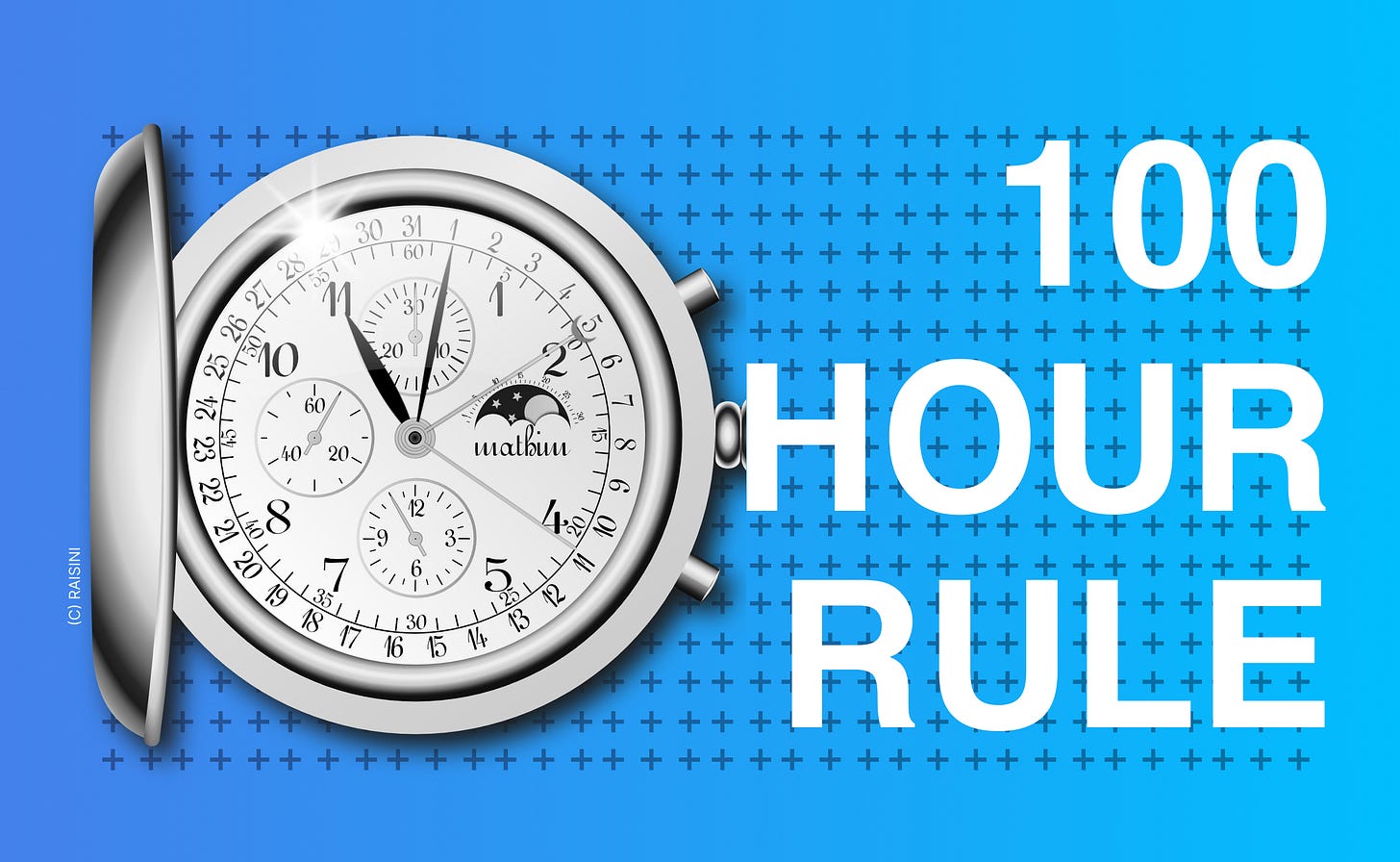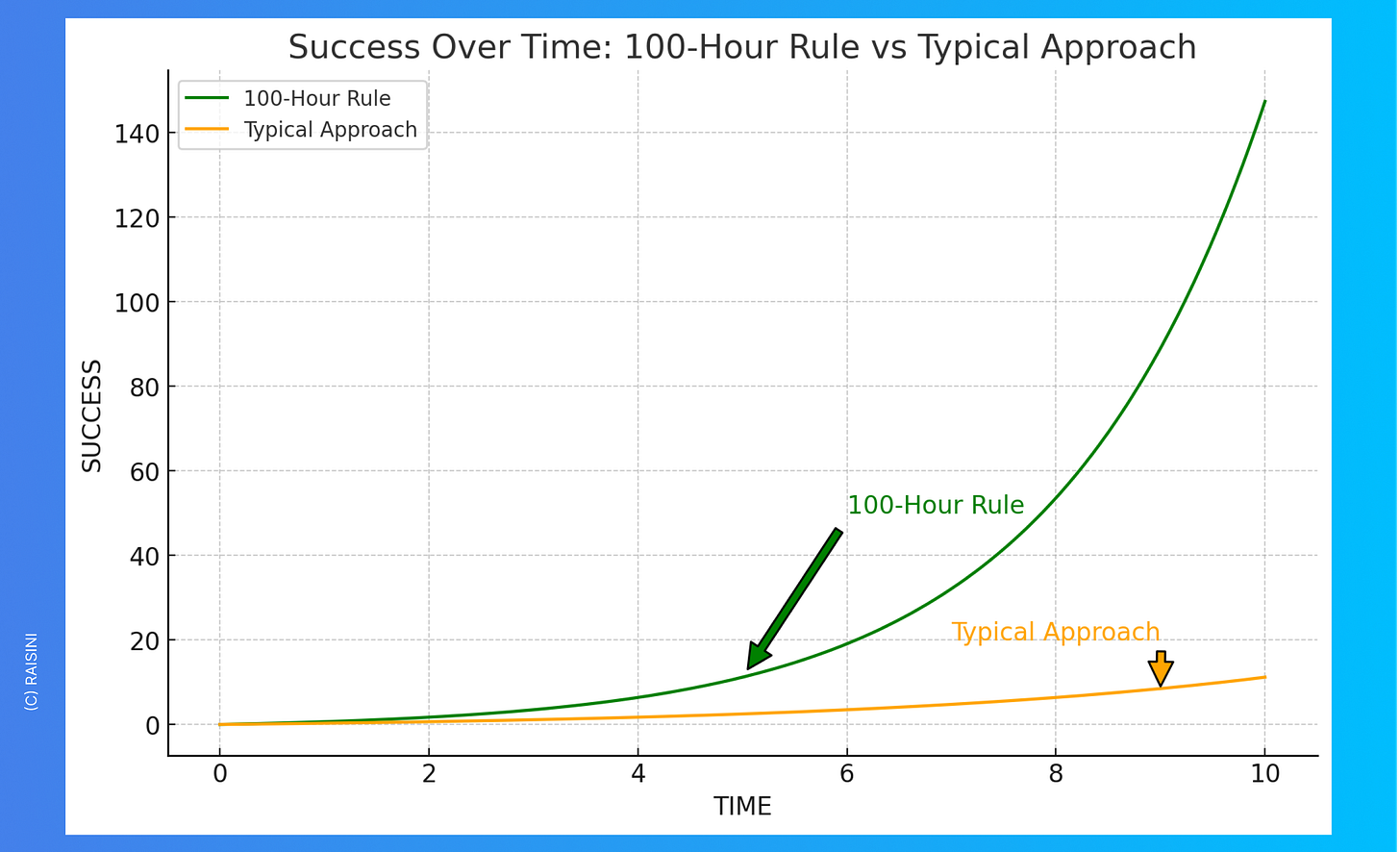100 Hour-Rule: How 18 Minutes a Day Can Make You Better Than 95% of The World
Use The 100-Hour Rule To Outsmart Others and Make $1,000 Per Hour
I remember the first time I heard about the Rule of 100.
It was at my first job back in 1999 from the CEO of Universal Music. I was very young and just started University, excited to get into the music business.
Three months into the job, I broke the company’s sales record, shipping millions of records to distributors and retailers. At the company annual event, I was sitting next to the CEO when he congratulated me on my hunger to learn and hustle. He then told me about the 10,000 hour Rule vs the 100 Hour Rule.
The concept seemed simple enough:
if you spend just 100 hours a year on any discipline, (which breaks down to about 18 minutes a day), you can become better than 95% of the world at that skill.
At first, it sounded too good to be true, but the more I thought about it, the more it made sense.
This idea has changed my life, and I want to share how it can change yours too.
The Origins of the 100-Hour Rule
The roots of the 100-Hour Rule can be traced back to 1976 when psychologist Anders Ericsson and his collaborator Bill Chase conducted a study that would eventually lead to the famous 10,000-Hour Rule.
They were replicating an experiment from 1929 where two students improved their ability to memorize random digits.
Ericsson and Chase's study showed that with consistent practice, a student named Steve Faloon could remember 82 digits after around 100 sessions, vastly exceeding expectations.
Ericsson's work focused on the concept of deliberate practice—purposeful, focused practice aimed at improving performance.
This principle was later popularized by Malcolm Gladwell in his book "Outliers," but Ericsson's findings also hinted at something else: significant improvement can happen much faster than 10,000 hours, sometimes within just 100 hours if the practice is well-directed.
The Science Behind the Rule of 100
The Rule of 100 is grounded in the concept of deliberate practice, a term coined by psychologist K.
Anders Ericsson. Deliberate practice involves focused, goal-oriented practice with the intention of improving performance. It’s not just about putting in the hours; it’s about making those hours count.
When you dedicate 18 minutes a day to deliberate practice, you are engaging in a consistent routine that compounds over time. This consistency helps in reinforcing neural pathways in your brain, making the skill more intuitive and easier to perform.
The idea is similar to how compound interest works in finance: small, regular investments grow exponentially over time.
Why The 100-Hour Rule Is Powerful
The power of the 100-Hour Rule lies in its ability to deliver quick results by concentrating on shorter, focused periods of learning rather than the daunting 10,000-hour standard.
By targeting specific micro-skills, we can achieve a level of proficiency much faster, within dozens of hours instead of thousands.
This approach allows us to stand out in less crowded, niche areas rather than competing in oversaturated fields.
Quick success is essential, especially for busy professionals managing work, family, and other interests, as it provides immediate, tangible benefits that maintain motivation.
Additionally, progressing rapidly in a skill is more enjoyable and encourages sustained effort and improvement.
This chart illustrates the concept of the 100-Hour Rule versus the typical approach. The green curve represents the 100-Hour Rule, showing a rapid increase in success over time. The orange curve represents the typical approach, showing a more gradual increase. This visual highlights the power of focusing on short, intensive periods of skill development to achieve faster and more noticeable results.
The Seed of Consistency
After my kidnapping in Ukraine back in 1998 and losing my hard-earned money, I was struggling to find my footing in the business world.
I had a lot of ideas but lacked the discipline to see them through or was confused about which idea to focus on first. Frustrated and feeling a bit lost, I landed the job at Universal Music, and I stumbled upon the Rule of 100 through my boss.
The idea was so straightforward that it almost seemed laughable. Spend 18 minutes a day on something, anything, and over time, you will see massive improvements.
At that moment, I decided to give it a try. I focused on the music business, which I had always wanted to learn but never found the right opportunity.
I was a complete novice; I had no clue how this business worked, but I committed to spending 18 minutes a day researching the industry and reading everything available on the internet. At times, I stayed back at work to continue researching after hours and would spend 2-3 hours a day.
Slowly but surely, I started to see progress.
My Journey with the Rule of 100
In my journey, the Rule of 100 became a guiding principle during a transformative period in my life. I was young and had an insatiable desire to learn, which made the idea of breaking down big goals into 18-minute daily chunks particularly appealing.
Here’s how I applied the Rule of 100 to the music business and how it changed my career:
Setting a Clear Goal: After landing my job at Universal Music, I decided I wanted to become proficient in the music industry. My goal was to understand the business intricacies well enough to contribute significantly and advance my career.
Finding Resources: I immersed myself in every resource available. I read books on the music industry, subscribed to relevant newsletters, attended webinars and conferences, and participated in forums. I also sought mentorship from seasoned professionals.
Creating a Routine: I dedicated at least 18 minutes every day to learning about the music business. Sometimes, this stretched to hours, especially after work, but the minimum daily commitment ensured that I made consistent progress.
Tracking Progress: I kept a detailed journal of my daily learnings. This not only helped me track my progress but also served as a motivational tool. Seeing the accumulation of knowledge over time was incredibly rewarding.
Applying My Skills: I eagerly applied what I learned to my job. Whether it was understanding contract negotiations, marketing strategies, or distribution logistics, I began to see tangible improvements in my work. This practical application reinforced my learning and showcased my growing expertise to my colleagues and superiors.
By consistently dedicating time to learning and applying the Rule of 100, I gained a deep understanding of how the music industry works.
This newfound knowledge not only positioned me as a valuable asset to my company, helping me break sales records, but also inspired me to take a significant leap in my career.
Equipped with the insights and expertise I had developed, I launched my own record label, Raisini Records and my entertainment agency RAISINI. This venture marked the beginning of an exciting new chapter, fueled by the consistent, deliberate effort I had invested every day.
The Impact on My Career
After a year of consistent practice, the results were nothing short of transformative. My deep dive into the music industry through the Rule of 100 didn’t just give me a better understanding of the business; it revolutionized my entire career trajectory.
I went from being a novice to launching my own record label, Raisini Records. This leap was a direct result of the comprehensive knowledge I had acquired.
My newfound expertise allowed me to release my own music, and soon I was touring the world as a DJ, sharing stages with major artists.
My role as a music producer flourished, leading to collaborations with industry giants. Additionally, through the agency RAISINI, I organized world-class concerts and club events, creating unforgettable experiences for audiences globally.
But the impact went beyond just these achievements. The discipline and consistency I developed from this routine spilled over into all aspects of my life.
I became more organized, focused, and determined. The Rule of 100 taught me the profound value of consistency and how small, daily efforts can accumulate into monumental success.
This approach not only expanded my career possibilities but also ingrained a mindset that anything can be achieved with dedication and persistence.
Applying the Rule of 100 to Different Areas of Life
The beauty of the Rule of 100 is its versatility. You can apply it to virtually any area of your life. Here are a few examples:
Learning a New Language: Spend 18 minutes a day practicing vocabulary, speaking, or listening to a new language. Over time, you’ll find yourself conversing more fluently.
Fitness: Dedicate 18 minutes a day to a workout routine. Whether it’s yoga, running, or strength training, those minutes will add up, leading to better health and fitness.
Reading: Commit to reading for 18 minutes each day. You’ll be surprised at how many books you can get through in a year, broadening your knowledge and perspective.
Playing an Instrument: Practice an instrument for 18 minutes daily. This consistent practice will improve your skills and possibly lead to new creative outlets.
Meditation: Spend 18 minutes each day meditating. This can significantly reduce stress, improve mental clarity, and enhance overall well-being.
The Power of Habits
The Rule of 100 is essentially about building habits.
When you do something every day, it becomes a part of your routine, and eventually, a part of who you are.
Habits are powerful because they automate behavior, reducing the mental effort needed to perform tasks. By turning deliberate practice into a habit, you ensure consistent progress.
Overcoming Challenges
Of course, no journey is without its challenges. Here are a few obstacles I faced and how I overcame them:
Lack of Time: It's easy to say you don't have time, but 18 minutes is manageable for almost everyone. I found that doing it first thing in the morning worked best for me. Find a time that suits your schedule and stick to it.
Motivation: Some days, you just don’t feel like it. On those days, I reminded myself of my goals and the progress I had made. Keeping a journal was particularly helpful in maintaining motivation. Reading through past entries and seeing how far I had come gave me the push I needed to keep going.
Plateaus: There were times when I felt like I wasn’t improving. During these periods, I sought feedback from others, adjusted my practice methods, and stayed patient. Improvement isn’t always linear. By experimenting with different learning techniques and seeking new challenges within the music industry, I was able to break through these plateaus.
Distractions: In our digital age, distractions are everywhere. To combat this, I made sure to create a focused environment for my 18-minute practice sessions, free from interruptions. Turning off notifications and setting clear boundaries during this time helped me maintain my concentration and make the most of each session.
Encouragement for Aspiring Entrepreneurs
If you’re an entrepreneur or someone looking to make a jump in your career, I can’t stress enough the importance of the Rule of 100. It’s a simple yet powerful tool that can help you acquire new skills, improve existing ones, and build the discipline needed for long-term success.
Here’s why you should embrace it:
Skill Development: In the competitive world of business, having a diverse skill set can set you apart. The Rule of 100 allows you to continually grow and adapt.
Innovation: By dedicating time to learning and improvement, you’re more likely to come up with innovative ideas and solutions.
Resilience: The discipline and consistency you develop will make you more resilient in the face of challenges and setbacks.
Confidence: As you see your progress and achievements, your confidence will grow, motivating you to take on bigger challenges.
Keep reading with a 7-day free trial
Subscribe to RΛISINI to keep reading this post and get 7 days of free access to the full post archives.




